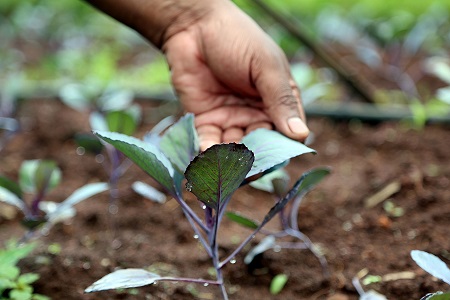All News
All News

20/03/2023
ROME - Transforming agri-food systems is important for adapting to man-made climate change and reducing greenhouse gas emissions, the Food and Agriculture Organization of the United Nations (FAO) said in a new report released today by the Intergovernmental Panel on Climate Change.
This synthesis report, the final report of the Sixth Assessment Reporting Cycle, was prepared in collaboration between governments and scientists around the world. The report shows that human activities such as greenhouse gas emissions have undoubtedly contributed to global warming. Other human activities include unsustainable energy use patterns, land use and land conversion, and consumption and production patterns.
The report highlights that agriculture, forestry and land use currently account for 22 percent of global greenhouse gas emissions.
In addition, the comprehensive report points out the direction of future work, emphasizing the promotion of climate resilience development and the overall planning and implementation of policies to adapt to climate change, which will help to form a countermeasure and achieve less or no greenhouse gas emissions.
FAO Deputy Director-General Maria Helena Semedo said: "Climate change is already a threat to agriculture and food security, with small island developing States, least developed countries and landlocked countries bearing the brunt, small farmers, pastoralists, forest dwellers , fishermen, indigenous peoples and women have all had their livelihoods destroyed.”
Deputy Director-General Semedo emphasized: "We must scale up and act now. The key to addressing the climate crisis, food insecurity and biodiversity loss lies in building sustainable and resilient agri-food systems."
Food and agriculture for climate action
Scientists at the Intergovernmental Panel on Climate Change strongly believe and emphasize that agriculture, forestry and land use offer options for adapting to and mitigating climate change that can be scaled up on a large scale in most regions in the short term.
For example, experts believe that the protection, management and restoration of ecosystems such as forests can effectively offset the economic losses caused by climate-related natural disasters.
Effective options for climate change adaptation are also abundant, such as breed improvement, water management and storage, soil moisture conservation, irrigation, agroforestry, community adaptation measures, farm and landscape level diversification of agricultural production and sustainable land management.
The Intergovernmental Panel on Climate Change also pointed out that coordinating policies is crucial to achieving goals such as food security, emphasizing that measures such as healthy diet transition, reduction of food waste, and sustainable agricultural development can reduce the impact on ecosystems and provide support for reforestation and biological restoration. Diversity integrates land resources.
In addition, the comprehensive report pointed out that although policy formulation and legislation to address climate change have improved to a certain extent, policy coverage in agriculture and other sectors is still insufficient, and agriculture, forestry and other land use sectors still face challenges in funding, mechanisms and mechanisms when implementing climate change mitigation measures. and governance barriers.
Deputy Director-General Semedo emphasized: "The report shows that the agricultural sector can take key climate actions. The report also emphasizes that climate change already poses a threat to agriculture, and the urgent need for agriculture to adapt to climate change is the only way to ensure food security and nutrition. Anyone left behind."
Deputy Director-General Semedo further pointed out: "Agricultural industries, including crops, livestock, forestry, fisheries and aquaculture, can provide responses to climate change adaptation and mitigation."
The Synthesis Report also highlights the importance of water for climate change adaptation across sectors. In this regard, FAO supports integrated water resources management to address water challenges related to climate change. The 2023 United Nations Conference on Water is about to start, and this conference is of great significance to agriculture.
The FAO Climate Change Strategy
FAO is working to implement the report's recommendations to promote climate resilience and adaptation in the agri-food sector.
The FAO Climate Change Strategy goes beyond food production to comprehensively cover crops, livestock, forestry, fisheries and aquaculture, and related value chains, livelihoods, biodiversity and ecosystems, with emphasis on women, youth and the integral role of indigenous peoples in driving transformation.
Based on rural, peri-urban and urban contexts and realities, the strategy supports countries, as appropriate, in designing, revising and implementing national initiatives and plans related to agri-food systems, such as nationally determined contributions, national adaptation plans, nationally appropriate mitigation actions, and reduction of greenhouse gas emissions Long-term development strategies, disaster risk reduction plans, etc.
In addition, the strategy integrates risk factors such as risk of inaction, systemic risk, climate and environmental risk reduction, in-depth analysis of the specific needs and capacities of vulnerable people and communities, and integrates climate risk management into FAO's work field.
FAO is also a partner of the Green Climate Fund, the world's largest climate fund that supports developing countries in proposing and implementing national climate plan targets.
Since their partnership in 2016, FAO and the Green Climate Fund have scaled up climate investments in high-impact projects to help the agriculture, forestry and fisheries sectors be more efficient, inclusive, sustainable and resilient to climate change. At present, the scale of various cooperation funds has exceeded 1 billion US dollars.
FAO also has specific initiatives such as 'Strengthening Agricultural Resilience' and 'Boosting Climate Change Ambitions in Land Use and Agriculture' to catalyze climate responses in the world's most vulnerable regions.
Anticipating and responding to major threats to agrifood systems from extreme weather events is another important area of work for FAO. Related work includes proactive action through early warning systems comprising advisory forecasts of extreme weather, financial and technical resources.
Zitouni Ould-Dada, Deputy Director of FAO's Office of Climate Change, Biodiversity and the Environment and IPCC Liaison The Commission's report gives new impetus to the 'fight for a better world'. We have evidence and innovative responses, and we know what works. Now it's time to break down barriers and build synergies."